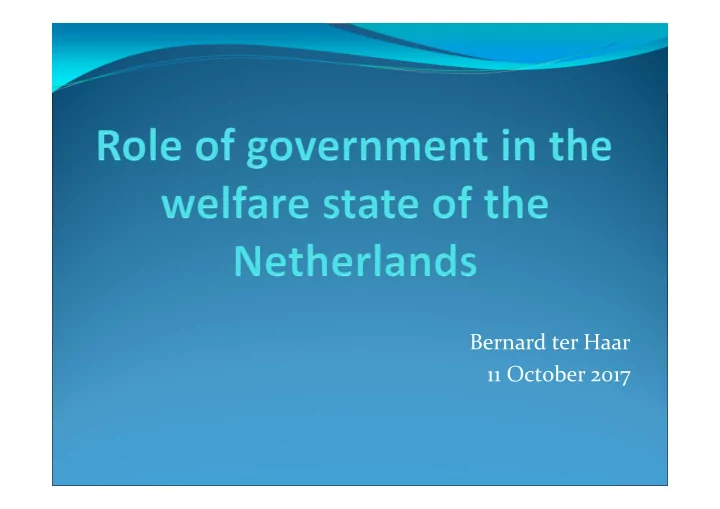

Bernard ter Haar 11 October 2017
1. How do we make policies in the Netherlands? 2. Decentralisation of social domain; an attempt for an integral approach; 3. Inequality and complexity; 4. The dynamics of the labour market and the slowness of the welfare state;
Parliamentary inquiry results of 2008 are still valid
Results Commission Dijsselbloem (2008): •Insufficient problem analysis; •Actions endangered vulnerable citizens; •Tunnel vision among responsible Ministers; •Political support more important than public support; •Those directly affected were not heard; •Many policy options were perceived as mandatory; •Substantial changes in regulation afterwards •Policy results deviated from policy commitment; •Too much importance given to international rankings; •Scientific support is lacking; •Risky implementation.
Dijsselbloem’s doctrine Thoughtful policy Take care of involvement process / public support Develop policy measures based on evidence, practice and experience Ensure feasibility of new measures Safeguard consistency
Requirements for a diligent policy process: 1 Experiments; 2 Multidisciplinary knowledge 3 Behavorial economics and psychology 4 Translation of research results into practice 5 Connection with the implementation; boundary conditions 6 Affiliation with social issues
Knowledge management = coherent cycle from diagnosing a need for knowledge to applying generated knowledge Need for knowledge Use of Development knowledge of knowledge Receiving Distribution knowledge of knowledge
Labour market Regions Different regions for care, education, etc… Governance?
•Workprogram on integral social approach; •Starting from bottlenecks (youth, care, work, income, disability), locally identified; •Collaboration of 5 central departments and local governments; •14 Themes; 14 working groups;
Weak labour market position of low skilled, handicapped and migrant workers 90 82 15-24, niet-scholier 77 74 totaal 68 70 66 ouderen (55 tot 65) 65 63 61 60 61 vrouwen 56 NWM 55 51 50 laagopgeleiden 48 42 46 arbeidsgehandicapt * 2016 geschat op basis van 2015 + mutatie van het 33 tweede kwartaal 2016 t.o.v. het tweede kwartaal 33 2015. 30 '03 '05 '08 '11 '14 '16*
Netherlands is doing very bad…. Difference in netto participation between handicapped en non-handicapped (2011)
Long term unemployment of elderly workers
Per maand | per kwartaal | per jaar | incidenteel Week 1 | Week 2 | Week 3 | Week 4 Compute Minimapa Kinder r- s Gezins -bijslag regeling -voogd LBIO Moeder (36) Kwijtscheld Jeugd Maat- (alime ing lokale zorg schapp Bijzonder Bijstand ntatie) heffingen elijk e bijstand Zwakke werk gezondheid Schuld Kind- - Individuel Schulden gebonden- Regeling hulpve e budget Zoon (13) Laag indirecte rlening inkomens schoolkost Wijk- -toeslag IQ, en verplegi Zorg- praktijkonderwij Huur- ng MEE toeslag toeslag s Stichting Dochter (10) Lokaal Collectieve Leergeld welzijn zorg- LVB, speciaal swerk verzekerin g onderwijs, CIZ Veilig Huisarts thuis Bijstand indicatie School- maatsch appelijk werk
5) Het middensegment zakt weg
Effect of digitalisation?
Net job creation is all flex work
Percentage temporary contracts in the Netherlands very high
Platform workers No disability insurance no unemployment benefits no pension no labour market power
High performance work practices
Large part of employees claims a lack of knowledge 80% 70% 60% 50% 40% 30% 20% 10% 0% Zakelijke dienstverlening Zorg & Welzijn Overheid Onderwijs Tekort aan inhoudelijke kennis Gebrek aan brede inzetbaarheid Te weinig bereidheid of vermogen tot scholing Te weinig bijscholing als werk veranderde
1. How do we make policies in the Netherlands? 2. Decentralisation of social domain; an attempt for an integral approach; 3. Inequality and complexity; 4. The dynamics of the labour market and the slowness of the welfare state;
Recommend
More recommend